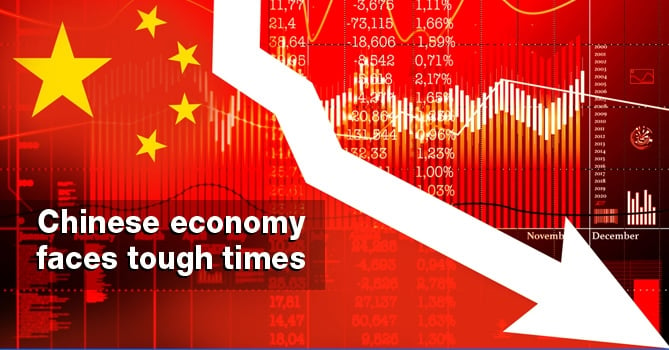Unpacking China's Economic Shift: Factors Behind the 2023 Slowdown(Also Me)
China's economic trajectory is undergoing a deceleration, a phenomenon that has elicited apprehension among international investors and policymakers alike. The second-largest global economy witnessed a year-over-year growth of 5.5% during the initial half of 2023, signifying a measured resurgence. Nonetheless, this figure fell short of the 5.8% growth target stipulated by the government and the 6.1% projection put forth by the International Monetary Fund. In the second quarter, the economic upswing escalated to 6.3%, up from a 4.5% surge in the inaugural quarter, largely attributable to a low base effect. Yet, when examined on a quarter-to-quarter basis, China's Gross Domestic Product (GDP) expansion experienced a deceleration, diminishing to 0.8% in the second quarter from 2.2% in the preceding one, underscoring a slowdown in the domestic economic resurgence.
The Zero Covid policy is exerting its toll: China has adopted an uncompromising zero-tolerance stance towards COVID-19, a strategy instrumental in quelling the contagion and hastening the resumption of regular activities compared to most nations. However, this approach also implies that any outbreak, regardless of its scale, has the potential to trigger a cascade of lockdowns, extensive testing drives, travel curbs, and quarantine protocols, all of which impede economic operations across diverse sectors. In August 2023, China reported several instances of COVID cases in various cities, including pivotal manufacturing hubs like Shenzhen and Tianjin, alongside esteemed tourist destinations such as Zhangjiajie and Xiamen. These outbreaks have cast a pall on consumer expenditure, industrial output, exports, and service sectors, particularly during the zenith of the summer season.
Beijing's interventions fall short: In contrast to the sweeping fiscal and monetary stimulus unfurled by China in 2020 to reinvigorate the economy in the throes of the pandemic, Beijing has approached policy support in 2023 with a more judicious and targeted demeanor. The government has accorded precedence to debt reduction and financial equilibrium overgrowth and has imposed tighter regulatory measures on assorted domains, encompassing property, technology, education, and entertainment. The central bank has also abstained from implementing interest rate cuts or modifying reserve prerequisites, opting instead for more measured measures like infusing liquidity into the banking system and disbursing focused loans to small-scale enterprises. Although these policies may augur well for China's protracted development, they have concurrently exerted a dampening influence on immediate-term growth prospects.
China's real estate sector grapples with adversity: The real estate domain stands as a cornerstone of China's economic edifice, constituting approximately a quarter of GDP, both directly and indirectly. Nonetheless, this sector has been ensnared in a grave crisis since late 2022, triggered by the default of Evergrande Group, China's foremost property conglomerate by sales, on its debt commitments, thereby inciting a domino effect resonating through other developers and creditors. The demise of Evergrande has laid bare the fragility of China's heavily leveraged property market, which has been propelled by excessive indebtedness, speculation, and overconstruction. This crisis has also cast a pall over consumer confidence and the demand for habitation, as well as the activities associated with construction and investments.
Climate change exacerbates the situation: China ranks among the nations most susceptible to the repercussions of climate change, grappling with a gamut of climate-related perils such as scorching heatwaves, protracted droughts, deluges, cyclonic tempests, landslides, and rampant wildfires. These perils can precipitate considerable human and material losses, in addition to inflicting damage on infrastructure, agriculture, water reservoirs, well-being, and societal stability. For instance, in July 2023, torrential rainfall triggered severe inundations in Henan province, resulting in the loss of over 300 lives and impacting upwards of 13 million individuals. The monetary toll wrought by this catastrophe was estimated to exceed $16 billion. Climate change can also cast a shadow on China's energy requisites and supply, heightening the demand for cooling while constricting the accessibility of hydropower.
China's technological behemoths face a waning investor base: China's technological sphere has constituted one of the most vibrant and innovative sectors of its economy, instrumental in propelling its digital metamorphosis, bolstering productivity gains, and bolstering global competitiveness. However, this sector has simultaneously confronted amplified scrutiny and oversight from Chinese authorities, who have accused certain tech titans of exploiting their market dominance, infringing upon user privacy, jeopardizing national security, and undermining societal values. Since the latter half of 2022, Beijing has instigated a series of crackdowns spanning various segments of the tech industry, encompassing e-commerce, financial technology, ride-hailing, gaming, social media, online education, and cryptocurrencies. These actions have eroded investor faith and precipitated the obliteration of billions of dollars in market capitalization for some of China's most eminent tech entities.
These constitute some of the paramount rationales underpinning China's economic deceleration in 2023. This deceleration holds ramifications not solely for China in isolation, but also reverberates across the globe, given China's pivotal role as a principal engine of global economic expansion and trade. How China navigates its economic challenges will be determinative of its forthcoming trajectory and influence on the world stage.
Peace Out

Comments
Post a Comment